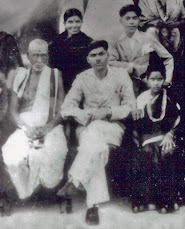Memory is one of our faculties. When I examine the contents of my consciousness, I come across two kinds of material provoked by images of the past.
One group of memories relate to items of information valuable for survival - my house address, date when I last paid my bills etc., the contents of a textbook from which I have to answer an examination paper. This may be called the purely cognitive content of memory.
The other set of memories which provide strong feeling and reaction seem to activate large segments of our body, especially our so-called autonomic nervous functions. These can be pleasant or unpleasant. Most of these have a great effect on our somatic resources.
 |
| "Memory" by Bernhard Wenzl via Commons |
While thought and feeling can be seen to be intermingled, it must be recognised that all evolution towards a higher performance involves differentiation. The mechanisms for such differentiations are available. Indeed, all capacity for learning depends on this fundamental property of the cerebral cortex to be able to generalise or differentiate response patterns.
Thought and feeling can be relatively separated.
One can learn to discourage, neutralise or remove painful memories which evoke unhealthy responses. If they cannot be removed, they can be neutralised by the addition of pleasant material. Memories are not some sacrosanct objects of unchangeable or unquestionable reality. They are selectively filtered perceptions - a fragment of impressions out of a vast totality of inputs that fall on one.
The first requirement for development of healthy memory is a person who recognises the deadly harm it does to his own body and its subtle mechanisms. Then the methods will be found within the resources of his own body.
A person who desperately feels the need for the habit of healthy memory can always find a few minutes a day to just take a look at his memories, and what they to him.
If you have systematically trained yourself to collect thorns on your daily round and also of storing them in our bed, you can also enjoy the resulting insomnia and tossing about in your bed. You can also ensure a miserable night for your family.
From the same environment, the fly collects rubbish; the honey bee collects honey. In the human being, this inbuilt capacity for selective collection is removed to allow for a much wider range of possibilities, and an almost unlimited capacity for learning new combinations.
To develop the capacity for sweet and grateful memories is not a social virtue - it is a necessity for good health.
If you have systematically trained yourself to collect thorns on your daily round and also of storing them in our bed, you can also enjoy the resulting insomnia and tossing about in your bed. You can also ensure a miserable night for your family.
From the same environment, the fly collects rubbish; the honey bee collects honey. In the human being, this inbuilt capacity for selective collection is removed to allow for a much wider range of possibilities, and an almost unlimited capacity for learning new combinations.
To develop the capacity for sweet and grateful memories is not a social virtue - it is a necessity for good health.
***











